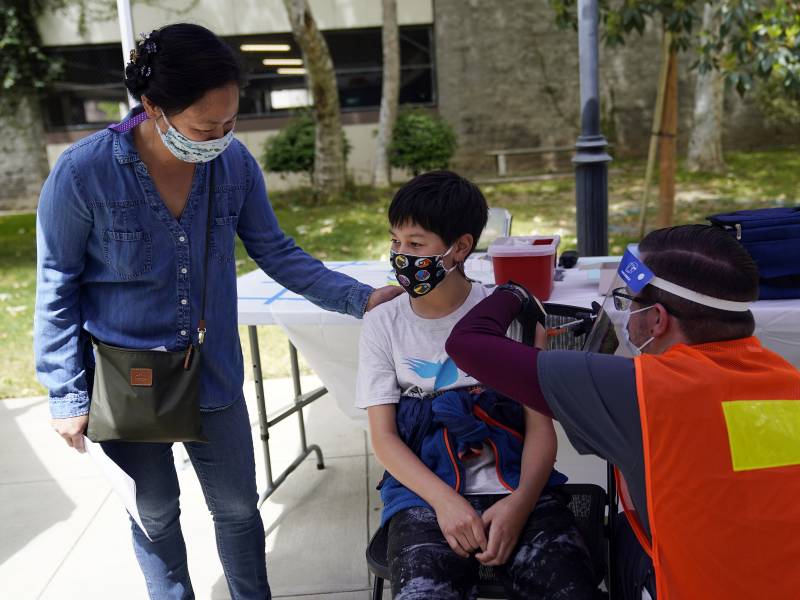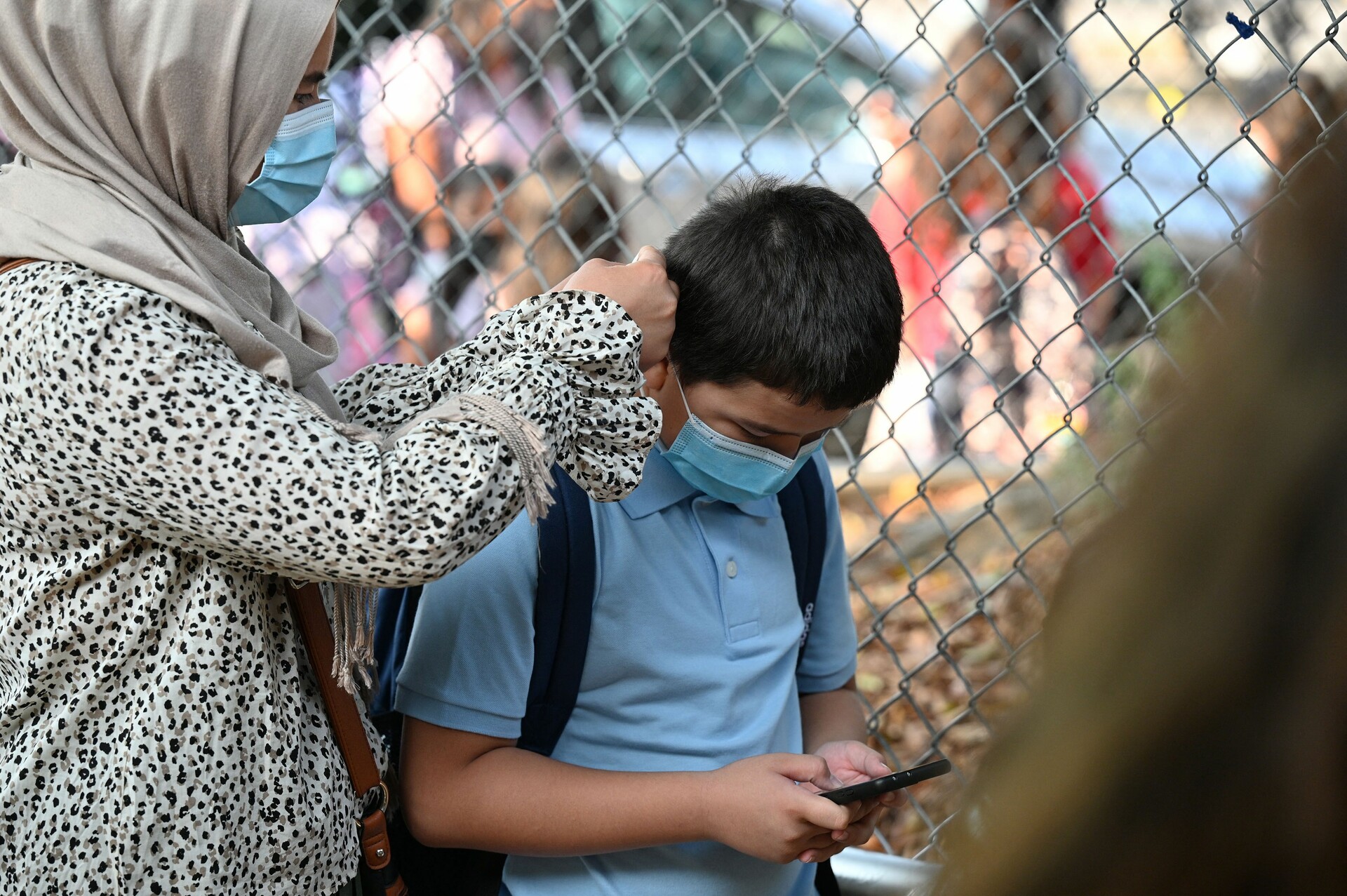In addition, more than 5,200 children and teens have developed MIS-C, or multisystem inflammatory syndrome in children, a condition linked to COVID-19 that often leads to ICU admission. The median age of kids getting MIS-C is 9 years old.
It’s hard to predict which kids who get COVID-19 will be struck with severe COVID-19 or MIS-C. In one CDC analysis of hospitalization records, roughly 30% of kids hospitalized with COVID-19 had no underlying health conditions that would have put them at increased risk.
“Everything about this virus is unpredictable,” says Dr. David Kimberlin, an infectious disease pediatrician at the University of Alabama at Birmingham. “And we need to do everything we can to protect ourselves and to protect our children against what this virus is very capable of doing.”
Black, Native American and Latino children were three times more likely to be hospitalized than white children, according to the CDC.
At least 791 children have died from COVID-19, including 172 children age 5 to 11. “I have sat beside the bed of patients who are struggling to breathe,” says Kimberlin. His hospital has treated many adolescents who were old enough to be vaccinated but hadn’t been and then ended up on ventilators or ECMO, extracorporeal membrane oxygenation. In this situation, he says, parents are grieving. “And in the back of their mind, they also know [it] could have been prevented,” Kimberlin says.
For some clinicians, the argument for vaccination comes down to the idea that no child should ever die from a disease that could have been prevented by simply getting a shot. “COVID-19 is now a vaccine-preventable disease from my perspective,” said Dr. Amanda Cohn, during last week’s FDA advisory committee that voted in favor of authorizing the vaccine for younger kids.
“It’s the eighth highest killer of kids in this age group over the past year,” Cohn said. “The use of this vaccine will prevent deaths, ICU admissions and will prevent significant long-term adverse outcomes in children.”
How well does the COVID-19 vaccine work for kids?
A clinical trial conducted by Pfizer and BioNTech studied a 10-microgram vaccine dose in children age 5 to 11. This is a third of the dose given to adults and children 12 and older. The lower dose was chosen to minimize side effects but still prompt a strong immune response, according to the vaccine makers.
The data the drug companies presented to the FDA showed that the vaccine was 90.7% effective against symptomatic COVID-19. The antibody response to the vaccine was comparable to the one seen in people 16 to 25 years old.
Pediatricians also point to real-world data on the effectiveness of the vaccines in 12- to 17-year-olds. Amid the recent delta surge, hospitalization rates were about 10 times higher in unvaccinated adolescents than vaccinated ones, according to a recent CDC analysis.
What are the common side effects?
No new safety problems were identified in the companies’ studies of this vaccine.
The most common side effects documented in the study were similar to those other age groups have had with COVID-19 vaccines. The most common were pain at the injection site, fatigue and headache and muscle aches. Kids who get the vaccine feel “ultimately fine in two or three days,” says Dr. Ibukunoluwa Kalu, a pediatrician and infectious disease specialist at Duke University.
When it comes to rare immediate allergic reactions to the COVID-19 vaccine, UCSF infectious disease specialist Dr. Peter Chin-Hong says there are already checks in place to catch these: namely, the 15-minute observation period after your child’s COVID vaccination, during which you and your child will be asked to stay at the vaccination site.
Back at home, at what point should a parent or caregiver call a child’s pediatrician about side effects after the COVID vaccine? Chin-Hong says to look for symptoms that persist for more than a day and get worse, not better — especially if it’s a fever.
Should I be concerned about serious side effects, especially myocarditis?
In very rare cases, following vaccination with mRNA vaccines made by Pfizer and Moderna, people have developed inflammation of the heart muscle, which is known as myocarditis. In Pfizer’s clinical trial for 5- to 11-year-olds, there were no cases of myocarditis, although the company acknowledged that the trials were not big enough to pick up such rare events.
Myocarditis after vaccination is “very, very rare,” explains Kimberlin. And it’s usually short-lived. In most instances, adolescents who’ve developed myocarditis have improved quickly. “The management of it usually is taking some ibuprofen — some Advil,” Kimberlin says.
Rates of post-vaccination myocarditis are expected to be lower in young kids than those observed in teens. Myocarditis, which can also occur after bacterial and viral infections, including COVID-19, is generally significantly less common among younger children. That’s partly because the condition is linked with puberty hormones, explains pediatrician Nicole Baldwin, who practices in Cincinnati.
And the smaller dose size for younger kids may also reduce the risk, Kalu adds. “The physiology behind why they saw some of the post-vaccine myocarditis seems to be related to how the immune system is reacting to the vaccine. It’s mounting a protective level of antibody, but maybe a little overzealous in those efforts,” she says.
Of 877 reports of vaccine-related myocarditis in people under 30, no deaths have been confirmed, according to data presented at the CDC’s advisory meeting Tuesday. Dr. Matthew Oster, who studies myocarditis for the CDC and is a pediatric cardiologist at Children’s Healthcare of Atlanta, explained that COVID-19 itself can cause myocarditis and other heart-related issues, as well as MIS-C, which often affects the heart.
“The bottom line is, getting COVID, I think, is much riskier to the heart than getting this vaccine,” Oster said.
Can’t I just wait a bit to see how vaccinations go before I vaccinate my kid?
Many pediatricians urge parents not to wait — first of all because their children will still be at risk for getting sick from COVID-19. “You can’t wait until millions and millions of doses are given before you decide, because this virus is going to take every opportunity it can to infect someone,” says Dr. Tina Tan, pediatrician and infectious disease specialist at Northwestern and Lurie Children’s Hospital of Chicago.
Even though COVID-19 cases are trending downward, 90% of counties in the U.S. are still classified by the CDC as having “high” or “substantial” viral spread.
“Because the delta variant is that much more transmissible, kids can get delta and can get quite sick from it,” says Tan. “You cannot predict — in a normal healthy child — who’s going to get very sick and who’s not. [Vaccinating] is the best way to protect your child against getting severe COVID illness.”
Acting FDA Commissioner Janet Woodcock made a similar point when she was asked about parents who wanted to wait to vaccinate their kids in a press conference Friday. “As a parent, if I had young children in this age group, I would get them vaccinated now,” she said.
Are there some kids who might be at higher risk and want to hurry to get vaccinated?
Certain families should consider getting in the front of the line for shots, Kalu says.
One group that should not delay, she says, are “kids that have conditions that may put them at higher risk for severe disease — and that could be as simple as obesity, chronic respiratory conditions, maybe even kidney disease or high blood pressure.”
For families with babies or grandparents or other vulnerable people — like an immunocompromised family member — at home, vaccinating your young children as soon as they’re eligible will help keep those people safe.
And if you live in an area where the weather is getting chilly, that’s going to mean people being indoors more often, which raises your risk of catching COVID-19.
Especially if you are having family members or friends in for the holidays, keep in mind that “it is safer to gather in a fully vaccinated environment than not,” Kalu says. “So even in just the interest of keeping your small community safe as you gather over the holidays, it may be good to get kids vaccinated prior to that.”
Baldwin agrees. “If we’re getting these kids vaccinated now before they go hug Grandma and Grandpa [during the holidays], that can offer additional protection to our more vulnerable population,” she says.
If my child already had COVID-19, do they need this shot? Don’t they have immunity?
Even for kids who’ve already had COVID-19, pediatricians say it’s still beneficial to get the vaccine. “We don’t yet really understand the duration of immunity when it comes to kids,” Baldwin explains. Often kids get mild infections, so “we don’t know what that correlates to in terms of antibody levels and how long [they are] going to be protected,” she says.
For kids who’ve had a very recent COVID-19 infection, she says, she understands why parents may not be the first to rush out and get the vaccine. It’s probable that their children have immunity in the months following the illness. But, ultimately, she says the vaccine is the best way to ensure strong and lasting protection against the virus.
Some parents might be tempted to get their child’s antibody levels tested, but Dr. Kate Russell Woodworth, a medical epidemiologist with the CDC, said at a CDC advisers’ meeting Tuesday that those tests aren’t a reliable way to determine whether a person is protected from reinfection. The CDC recommends against using them for vaccination decisions.
If my kid is 11, should we wait to get them the higher, adult dose at age 12?
“I would not advise waiting,” says Baldwin. “I think it’s important for parents to understand [that in clinical trials] the lower dosage provided as robust an immune response as the higher dosage did in older kids with less side effects.”
Baldwin says if your child has a 12th birthday coming up very soon, she says it’s OK to wait, but the dose provided in the children’s formulation is enough to protect them from the virus.
If your child turns 12 between their first and second dose, the American Academy of Pediatrics suggests sticking with the lower, 10-microgram dose for both shots.
What if my child is used to wearing a mask by now? Can’t I just rely on that for prevention?
Masks have proven to be a key tool for preventing outbreaks in schools, but some experts point out that indoor masking can’t go on forever.
“We actually have to open back up,” Dr. Hayley Gans, pediatrician and infectious disease specialist at Stanford University and Lucile Packard Children’s Hospital, said during the FDA advisory meeting. “We can’t forever have mitigation — particularly in schools — and children need to return to a more open life, as we all do.”
As cases continue to drop across the country, mask mandates may be lifted, which could increase the likelihood that — especially unvaccinated — kids could get COVID-19.


9(MDAxOTAwOTE4MDEyMTkxMDAzNjczZDljZA004))
